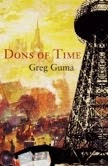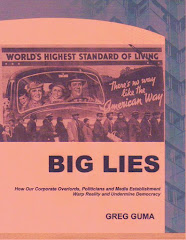This Week: October Surprises, Pot as a Wedge Issue, Private Spies, Profiling Activists, Setting Up ACORN, Obama’s Economic Plan, and Vermont’s Progressive Moment
SHOCK TREATMENT. They call it the October Surprise, the idea that a news event – perhaps manipulated by some group -- with the potential to influence the outcome of a presidential election bursts upon the scene in the last month of the campaign. The term was first used in 1980, initially when rumors spread that Jimmy Carter was preparing a military invasion of Iran to rescue the hostages and help him get reelected. Later, allegations surfaced that Ronald Reagan’s team had its own “surprise,” purposely slowing down the hostage release to block a boost for Carter. Whatever the truth, Reagan won.
But it goes back farther. In October 1968, for instance, as the race between Humphrey and Nixon was winding down, President Johnson announced a bombing halt of North Vietnam on October 31. He apparently hoped that peace negotiations would bear fruit by the time of the election. It didn’t happen, and Nixon won. Let’s call that Mission (Not) Accomplished.
1972: Less than a month before the election between Richard Nixon and George McGovern, Nixon's Secretary of State, Henry Kissinger, announced that "peace is at hand" in Vietnam. Nixon was already winning, but Kissinger's statement increased Nixon's standing. The war continued until 1975. Obvious, that’s the Just Kidding Surprise.
1992: Just four days before the election, Ronald Reagan's defense secretary Caspar Weinberger was indicted in the Iran-Contra scandal. Republicans accused the Independent Counsel of timing the announcement to hurt George H.W. Bush's re-election chances. Clinton won, but on Christmas Eve 1992 in the waning days of the first Bush presidency, Bush pardoned Weinberger – just days before his trial was scheduled to begin. I guess that’s technically a double Surprise. I just call it a Double Cross.
2000: Days before the election, Fox News unearthed an old report that George W. Bush had been arrested for drunk driving in that state in 1976. Considering the source, this may have been an October Surprise preemption – a way to defuse the impact of the story. Whatever, it’s still an Oh, Really Surprise.
2004: On October 29, Al Jazeera aired a video of Osama bin Laden. He called out the Bush administration and said, "Your security does not lie in the hands of Kerry, Bush, or al-Qaeda … Your security is in your own hands.” Heavy. This may have given Bush a bounce, putting the War on Terror back in the center of the debate. Most likely, this was an example of the Unintended Surprise.
So, what’s the surprise this October? The financial meltdown, capturing bin Laden, Nancy Reagan’s broken pelvis? Is it still ahead…?
WEDGE ISSUE? Here’s a surprise. In California, Massachusetts and Michigan people will have a chance in November to revisit their states' policies on marijuana. In California and Massachusetts, voters will decide whether to join 10 other states that have decriminalized the possession of small amounts of marijuana. Instead of facing arrest and time behind bars, those caught with up to an ounce of grass would be subject to civil fines of $100 or less – similar to a traffic violation. Meanwhile, Michigan could become the first state in the Great Lakes region to authorize medical marijuana. So, pot becomes a wedge issue in Michigan. Who knew?
PRIVATE SPIES. This shouldn’t come as a surprise, but it probably will. About 70 percent of intelligence work around the world is now outsourced to private companies. So says Tim Shorrock in his new book, Spies for Hire, which focuses on the privatization of the intelligence industry. In dollars, that means $50 billion going to private spooks each year – with little or no oversight of any kind. I’ve been tracking this for about eight years, privatizing intelligence, the military – basically outsourcing national defense. To find out more, check out Maverick Media reports on military privatization.
WATCHING ACTIVISTS. Speaking of spies, evidence is mounting that activists are being classified as terrorists. A recent example out of Maryland: More than 50 people, including two Catholic nuns, a congressional candidate, and a guy who campaigns against military recruitment at high schools. When they recently had a chance to look at their files in federal and Maryland data bases, they discovered a surveillance operation focusing on them and others. It began in 2005, but it’s unclear how long it went on. Opponents of the death penalty, Iraq War, and biodefense research were among the targets. The files were obtained by the ACLU after a lawsuit.
One of the targets was Pat Elder, who leads a national network that opposes military recruitment in high schools. When he called the police to review his file, he was told he would get only a half-hour. When he requested more time, the cop on the phone said, OK, he could have it – and, by the way, his file was "quite extensive."
No surprise there.
REALITY CHECK. One sign that Republicans are becoming desperate is one of their new strategies – to raise concerns about voter fraud. Yes, the Republicans. Who said irony is dead? But the attempt to target ACORN – short for the Association of Community Organizations for Reform Now – and link it to the Obama campaign is pretty misleading.
A little background. ACORN was founded in 1970. It’s a community-based organization that advocates for low- and moderate-income families, working on neighborhood safety, health care and other social issues. It also registers voters. Obama did a little free legal work for the group 13 years ago. In early October, ACORN announced that it had registered 1.3 million new voters for the November election. If you’re Republican, this is scary. But sometimes people hired by ACORN to sign up new voters get lazy and submit phony names. The truth is that non-existent people can’t vote – so it’s not VOTER FRAUD – and ACORN itself flagged the problem.
But some people, including McCain’s campaign, have seized on reports of apparently fraudulent voter registration forms in some states, claiming that ACORN is committing "voter fraud." To be clear: It's not voter fraud unless someone shows up at the voting booth on Election Day and tries to pass himself off as someone else. By the way, McCain himself praised the group publicly just two years ago.
According to New York University's Brennan Center for Justice, "There are no reports that we have discovered of votes actually cast in the names of [false] registrants." Under most state laws, in fact, voter registration organizations like ACORN have to turn in all the forms they receive, even the suspicious ones. Then they flag any problem forms – which is exactly what ACORN did.
Still, the real concern – that many voters will find it difficult in November to cast their ballots due to a real problem, various forms of active voter suppression – remains. It’s not about ACORN. It’s about the gatekeepers at the ballot box.
ECONOMIC ARMADEGGON, WEEK FIVE: If you need any more proof that Reagan’s anti-government revolution is over, listen to this. The speaker is James Baker III, Republican stalwart and the man to helped George W. become president during the Florida election fiasco in 2000. On October 12, he said, “This is bigger than the private sector can fix by itself.” So, there you go.
Now, we have governments around the world stepping in, and the US government wanting an ownership stake in banks for putting up money to save them. It’s not socialism and not unprecedented, but it is a surprising development.
In 1917, the government seized the railroads to make sure goods, weapons and troops moved smoothly during World War I. Bondholders and stockholders were compensated, and railroads were returned to private ownership after the war ended. During World War II, Washington seized dozens of companies including railroads, coal mines and, briefly, the Montgomery Ward department store chain. In 1952, President Harry Truman seized 88 steel mills across the country, saying that their owners were provoking an industry-wide strike that would cripple the Korean War effort. That time, the Supreme Court ruled the seizures an unconstitutional abuse of presidential power.
In 1984, the government took an 80 percent stake in the Continental Illinois National Bank and Trust. The bank had failed, in part, because of bad oil loans in Oklahoma and Texas. One of the country's top 10 banks at the time, Continental Illinois was considered "too big to fail" by regulators, who feared wider turmoil in the financial markets. Sound familiar? It was sold to Bank of America in 1994.
The nearest precedent for the new plan is the investments made by the Reconstruction Finance Corporation in the 1930s. It not only made loans to distressed banks. It bought stock in 6,000 banks, at a total cost of about $3 billion. When the economy eventually stabilized, the government sold the stock to private investors or the banks themselves.
This week the stock market slowly recovered, but the mood remained – as they say on Wall Street – volatile. Meanwhile, both presidential candidates pushed recovery plans. Here is Obama’s – a four step proposal to create jobs and cushion people against the effects of the economic downturn.
The proposals: temporary tax credits for firms that create new jobs in the US, penalty-free withdrawals from retirement accounts, and temporarily barring banks from foreclosing on people trying to pay their mortgages. Obama also calls on the Federal Reserve and the Treasury Department to set up a facility to lend to state and municipal governments, similar to the steps recently taken by the Federal Reserve to inject liquidity into the commercial debt market. The idea is to unfreeze markets for individual mortgages, student loans, car loans, loans for multifamily dwellings and credit card loans.
COMMENT
A VERMONT SURPRISE? Vermont is clearly going for Obama this year, but the real question is the race for governor. Until recently, Jim Douglas looked like a shoo-in. But something unusual is happening. The Independent candidate Anthony Pollina has pulled ahead of the Democrat, Gaye Symington. Douglas is in the high 40s, Symington is stuck at around 20 percent, and Pollina has about 25. If nothing changes, Douglas would have the most votes but the state legislature would make the decision.
But what if the Obama surge, along with a successful insurgent campaign here, moved Pollina up another 10 points between now and election day. It takes money, but it could happen. Pollina is arguably the strongest, best qualified Independent candidate for governor in almost a century.
Douglas’s record on energy efficiency and Vermont Yankee is weak. As he has for decades, Douglas drifts along on a cloud of mediocrity and avoidance of responsibility. Basically, he’s complacent, and running in a state where the political leaders are Pat Leahy and Peter Welch, liberal Democrats, and Bernie Sanders, a democratic socialist.
Right now, we’re watching “free market” capitalism go off a cliff, and potentially take the rest of us with it. There could be a snowball effect as people wake up and realize what’s at stake. If Pollina picks up another 10 points, it becomes anybody’s race. Specifically, it becomes more than likely that no candidate will get 50 percent of the vote statewide. And that could make a big difference.
If no one wins 50 percent, the Democratic-controlled legislature decides who takes office. The highest vote-getter is usually picked, but it’s not a rule. And the lawmakers – who are also elected, after all – get to use their own judgment. In 1976, they picked Republican Garry Buckley for Lieutenant Governor even though the Democrat had more votes.
It could happen. If Pollina gets substantially more votes than Symington, the state legislature could face a fundamental choice – confirm an out-of-touch Republican, at a time when the state and country is rejecting the GOP “brand,” or vote for change.
As the country goes for Obama, Vermont could have a chance to break the two-party monopoly. I could be wrong, but this looks potentially like a pretty good surprise.
To hear Greg Guma discuss the week’s news live, listen to "The Howie Rose Show," Fridays at Noon, EST on WOMM-LP. Streamed on The Radiator.































1 comment:
Anthony Pollina is moving up in part because he is out there talking and listening to Vermonters. Check out his issues at www.anthonypollina.com.
Post a Comment